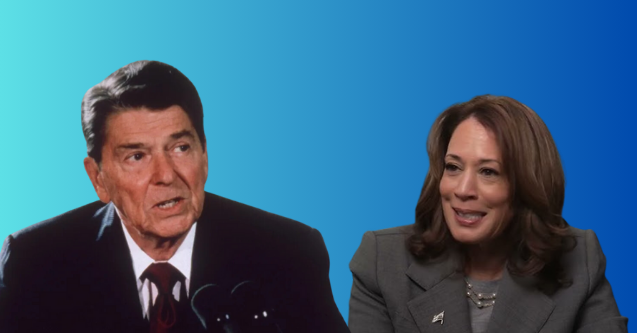Corporate tax policy has long been a point of contention in American politics, with two starkly contrasting views often represented by conservative and progressive camps. Ronald Reagan, the 40th President of the United States, staunchly advocated for lowering corporate tax rates, believing that high corporate taxes are, in essence, hidden taxes on consumers. Kamala Harris, the current Vice President, has taken a different approach, proposing tax increases on corporations to fund social programs and reduce inequality.
Ronald Reagan’s Viewpoint: “Corporate Taxes are Hidden Sales Taxes”
Reagan’s approach to corporate taxation was rooted in his broader economic philosophy of supply-side economics, sometimes called “Reaganomics.” He believed that lower corporate taxes would stimulate investment, economic growth, and job creation. In his view, raising corporate taxes didn’t just affect the companies; it trickled down to harm consumers, employees, and the economy as a whole.
Reagan argued that corporations would pass on any increase in taxes by:
- Raising Prices: Increasing product and service costs to compensate for the additional tax burden.
- Cutting Wages or Benefits: Reducing costs through workforce-related adjustments.
- Lowering Investment: Reducing investments in new technologies or expansions that could otherwise boost economic growth and job opportunities.
Reagan famously reduced the corporate tax rate from 46% to 34% in 1986 as part of the Tax Reform Act (The Public Papers of President Ronald Reagan). His goal was to make the U.S. a more attractive place for businesses, stimulate competition, and ultimately benefit consumers through lower prices and greater product availability.
In his own words from a 1985 speech, Reagan stated: “Every tax on business is just a part of the cost of production, and the customer winds up paying it when he buys the product. It’s a hidden sales tax”. He argued that high corporate taxes would ultimately punish the middle class rather than achieve the intended outcome of reducing inequality.
Kamala Harris’s Current Proposal: “Tax Corporations to Fund Social Programs”
Kamala Harris and the Biden administration are proposing raising the corporate tax rate to 28% from its current level of 21%. The goal is to generate revenue for social spending programs, such as infrastructure, education, and healthcare. Proponents argue that corporations are not paying their “fair share” and that increased taxation on wealthy companies would help close the gap between the rich and poor.
Harris’s stance on raising corporate taxes is built on the premise that corporations have benefited disproportionately from past tax cuts, including the 2017 Trump tax cuts, which slashed the corporate rate from 35% to 21%. She views these tax increases as a way to redistribute wealth and ensure that large corporations contribute more to funding the social safety net.
Ronald Reagan’s Counterargument to Harris’s Proposal
If Reagan were to debate Harris on her proposed tax plan, his argument would likely focus on several key points:
- Impact on Consumers: Reagan would likely argue that raising corporate taxes is, in effect, a hidden sales tax on the very people Harris claims to help—lower-income and middle-class Americans. Citing his belief in tax incidence theory, he would contend that corporations will not absorb the tax hike but will pass it on in the form of higher prices, especially in industries with low price elasticity (e.g., utilities, consumer staples). (National Bureau of Economic Research)
- Effect on Wages and Employment: Reagan would also argue that the tax hike could hurt workers by forcing companies to cut wages or benefits to manage increased costs. He would cite his own economic record, which saw significant job creation and economic expansion following his tax cuts. A 2018 study by the American Economic Review found that corporate tax cuts tend to increase wages in the long run by boosting overall investment. (American Economic Review)
- Impact on Economic Growth: Reagan might further argue that Harris’s tax plan would stifle economic growth by reducing corporate profits, which are a primary source of reinvestment into new technologies, infrastructure, and job creation. He would point to the 1980s, when his policies aimed to reduce the tax burden on businesses and the economy grew by an average of 3.5% annually. (U.S. Bureau of Economic Analysis)
- Global Competitiveness: Finally, Reagan might argue that raising corporate taxes would harm U.S. competitiveness, especially as other countries continue to lower their own rates to attract multinational businesses. During his time, Reagan reduced the corporate tax rate to make the U.S. more competitive globally. Today, a similar argument holds, as the average corporate tax rate among developed nations is around 23%, meaning a 28% rate would place the U.S. at a disadvantage. (OECD Tax Database)
Reagan’s Final Word
In essence, Reagan would likely argue that Harris’s tax plan might have good intentions but would backfire by ultimately burdening consumers and hurting the economy. He would suggest that instead of raising corporate taxes, policymakers should focus on broadening the tax base, closing loopholes, and reducing wasteful spending to ensure fiscal responsibility.
Conclusion
The debate between Reagan’s and Harris’s tax philosophies underscores the broader clash between supply-side economics and progressive tax policy. While Reagan focused on creating conditions for growth through lower taxes, Harris seeks to address inequality through targeted tax increases on wealthier entities. Both approaches have their merits and potential pitfalls, making this debate a defining issue in U.S. economic policy.
For more on Ronald Reagan’s tax philosophy, visit Reagan’s Major Speeches or The Public Papers of President Ronald Reagan.his debate a defining issue in U.S. economic policy.





